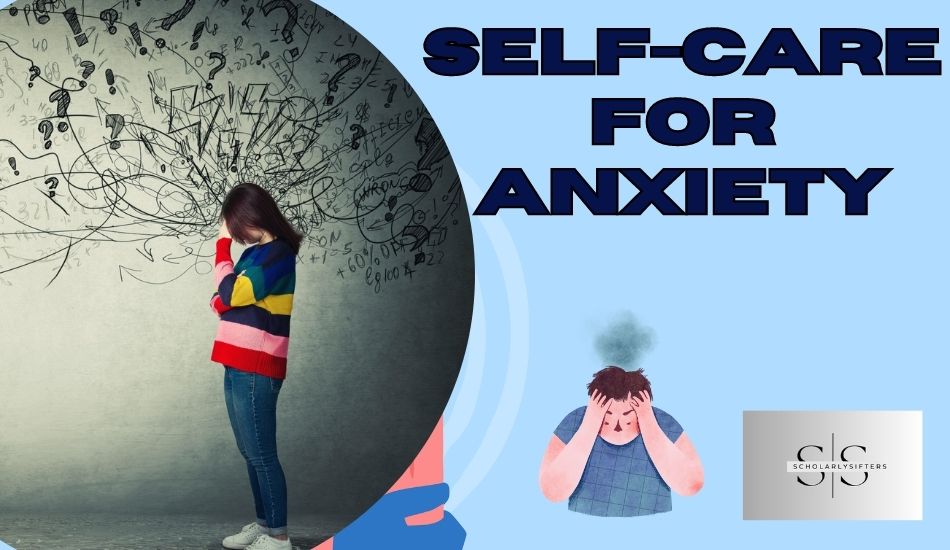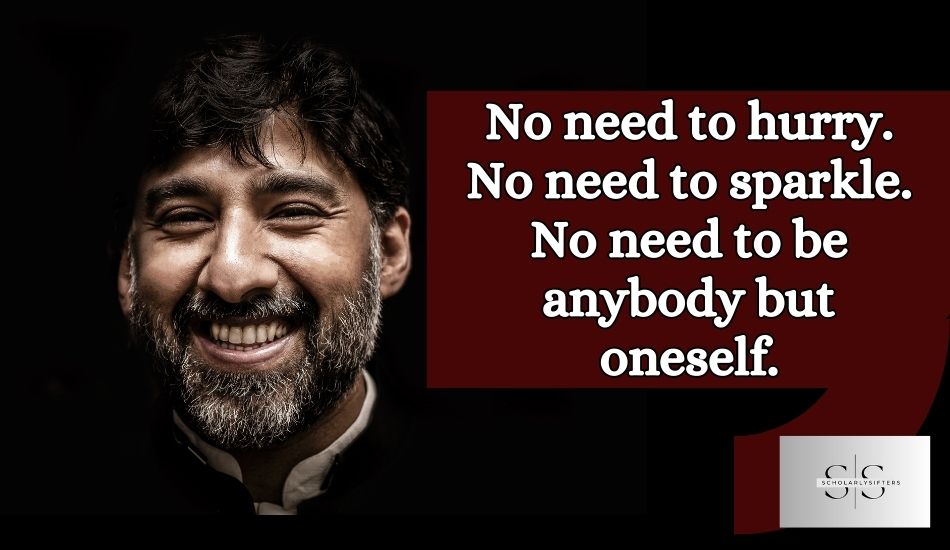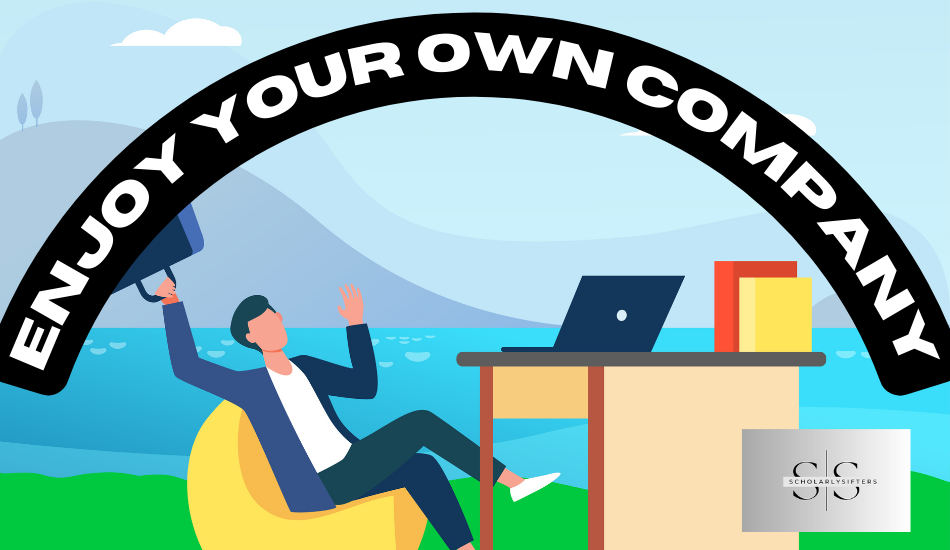No products in the cart.

Self-Care for Anxiety: A Comprehensive Guide to Cultivating Calm
Introduction

It’s simple to be overcome by the unrelenting waves of anxiety amid the whirlwind of modern life, when demands are constant and expectations are high. Self-care, though, is an oasis of calm amidst this confusion and fear. Self-care for anxiety is not only a self-kind gesture in a world that frequently appears unforgiving; it is also a crucial component of preserving one’s mental and emotional health. Anxiety, that restless companion that accompanies us through life’s challenges, can often find refuge in the corners of our minds. It’s crucial to recognize that it’s not weakness that invites anxiety in – it’s the sheer complexity of existence. Amid the myriad responsibilities and pressures, we must turn inward and discover the restorative power of self-care.
The Essence of Self-Care for anxiety
Self-care for anxiety, often misconstrued as a luxury, is in fact a necessity, especially when dealing with anxiety. It’s the art of tending to our own needs – emotionally, mentally, and physically – in order to replenish our inner reserves and cultivate resilience. While it may vary for each individual, the essence remains the same: honouring oneself and carving out moments of solace amidst the chaos.
Navigating the Path Ahead
The purpose of this exploration into self-care for anxiety is to guide you on a journey of self-discovery and nurturing. Together, we will delve into the various dimensions of self-care, from cultivating mindfulness to embracing self-compassion. By understanding the intricacies of self-care, we empower ourselves to combat the shadows of anxiety with the light of self-love and understanding.
Significance of Addressing Anxiety
Anxiety affects people all around India, whether they live in the crowded streets of the metropolis or the tranquil countryside. Anxiety has become an unwelcome companion for many people due to the high demands of scholastic and professional life as well as the complexity of contemporary society.
Stress levels may be increased as a result of a fast-paced lifestyle, societal expectations, and the constant flow of information. It’s important to understand that anxiety has no bounds and can affect people from all areas of life, regardless of age, gender, or origin, especially in a nation known for its cultural diversity and rich legacy.
Importance of Developing Coping Strategies
The importance of developing effective coping strategies cannot be overstated. Coping strategies empower individuals to navigate the turbulent waters of anxiety and emerge stronger and more resilient. Just as a ship equips itself to face storms, so must we equip ourselves to confront the storms of anxiety that can disrupt our mental equilibrium.
Self-Care for Anxiety: Understanding Anxiety
Anxiety is a thread that permeates a vast number of people’s lives in the tapestry of human emotions. Anxiety, which is a normal reaction to stress, turns into a problem when it outpaces our capacity for adjustment. It appears in many different ways, each with its own distinctive subtleties. The range of anxiety disorders is as varied as the human experience itself, ranging from Generalised Anxiety Disorder (GAD), which is marked by constant worry, to Panic Disorder, which causes abrupt and acute attacks of panic.
Common Triggers and Symptoms
Anxiety often emerges as a response to life’s uncertainties and challenges. The triggers can range from seemingly mundane events like public speaking or taking exams to more profound sources such as trauma or major life transitions. Recognizing the symptoms of anxiety is crucial to early intervention. These can include heightened restlessness, racing thoughts, increased heart rate, muscle tension, and difficulty concentrating. As anxiety takes hold, it can lead to a cycle of avoidance behaviours that perpetuate its grip.
Impact of Anxiety on Mental and Physical Health
The ramifications of anxiety extend far beyond fleeting worry. Its effects can infiltrate every facet of our lives, affecting both mental and physical well-being. Mentally, anxiety can erode self-esteem, disrupt focus, and even lead to depression. Physically, chronic anxiety can trigger a cascade of bodily responses – from tension headaches to digestive issues. Over time, the cumulative toll of anxiety can contribute to weakened immune systems and cardiovascular problems.
Self-Care for Anxiety and Lifestyle Changes
Importance of Sleep, Nutrition, and Exercise
Amid the tempest of anxiety, self-care for anxiety acts as a lighthouse guiding us towards calmer waters. Adequate sleep, balanced nutrition, and regular exercise lay the foundation for mental and physical well-being. Sleep rejuvenates the mind, nutrition fuels the body, and exercise releases endorphins that uplift the spirit. Prioritizing these elements nourishes our resilience, equipping us to better navigate the challenges anxiety presents.
Self-Care for Anxiety: Cognitive Techniques
Identifying and Challenging Negative Thought Patterns
Anxiety often takes root in distorted thought patterns that magnify worries and fears. Cognitive techniques involve identifying these distortions, like catastrophizing or overgeneralizing, and challenging their validity. By questioning the accuracy of negative thoughts, individuals gain perspective and diminish the power anxiety holds over their minds.
Practicing Positive Self-talk
The dialogue we have with ourselves can shape our emotional landscape. Practicing positive self-talk involves cultivating an inner narrative that promotes self-compassion and optimism. When anxiety whispers doubt, positive self-talk counteracts with encouragement and understanding.
Self-care for Anxiety: Social Support and Communication
Seeking Help from Friends, Family, or Support Groups
Isolation can intensify anxiety’s grasp. Reaching out to friends, family, or support groups fosters connection and reminds us that we’re not alone in our struggles. Sharing experiences and receiving empathy can provide comfort and perspective.
Effective Communication about Anxiety with Others
Opening up about anxiety with loved ones can bridge understanding and create a supportive environment. Communicating needs, triggers, and coping mechanisms fosters empathy and equips those around us to provide meaningful support.
Professional Interventions for Coping with Anxiety
Cognitive-Behavioural Therapy (CBT)
Cognitive-Behavioural Therapy, a cornerstone in anxiety treatment, helps individuals understand the connections between their thoughts, emotions, and behaviours. By identifying and challenging negative thought patterns, CBT equips individuals with practical tools to reframe their perspectives, ultimately diminishing the grip of anxiety.
Dialectical Behaviour Therapy (DBT)
Dialectical Behaviour Therapy is particularly effective for managing intense emotions that accompany anxiety. By teaching emotional regulation, distress tolerance, and mindfulness skills, DBT empowers individuals to navigate anxiety’s tidal waves with greater composure.
Exposure Therapy
Exposure Therapy confronts anxiety head-on by gradually exposing individuals to anxiety-inducing situations. This controlled exposure helps desensitize the fear response, allowing individuals to build resilience and master their reactions to triggers.
Self-Care for Anxiety: Medication and Support
Self-care for Anxiety: Importance of Medical Professional Guidance
The synergy between therapy and medication can be potent, but it’s crucial to navigate this path with the guidance of medical professionals. Mental health practitioners and doctors collaborate to determine the right combination, dosage, and duration of treatment, tailoring interventions to individual needs.
Professional interventions offer a lifeline for those wrestling with the weight of anxiety. Psychotherapies like CBT and DBT rewire thought patterns and equip individuals with coping strategies, while exposure therapy provides a path to conquering fears. Medications, when prescribed and managed by experts, can alleviate symptoms, facilitating engagement in therapeutic work.
Time Management and Stress Reduction
Prioritizing Time Management
Balancing responsibilities can be overwhelming, amplifying anxiety. Effective time management helps allocate time to tasks and leisure, reducing the strain of last-minute rushes. Creating schedules and to-do lists fosters a sense of control over daily activities.
Stress Reduction Techniques
Stress fuels anxiety, and stress reduction techniques offer a pathway to tranquillity. Engaging in activities like yoga, meditation, and deep breathing lowers cortisol levels, calming the body’s stress response. Engaging in these techniques regularly fortifies resilience against anxiety’s impact.
Developing a Personalized Anxiety Management Plan
Identifying Triggers and Early Warning Signs
Self-care for anxiety, Every individual’s anxiety is unique, often triggered by specific situations or circumstances. Identifying these triggers and recognizing early warning signs is the first step in crafting an effective management plan. By acknowledging these cues, individuals can pre-emptively deploy coping strategies before anxiety escalates.
Choosing Appropriate Coping Strategies
One size does not fit all when it comes to anxiety management. Each person’s toolkit of coping strategies will be tailored to their preferences and needs. Whether it’s deep breathing, journaling, engaging in physical activity, or seeking social support, the key is to select strategies that resonate and provide relief.
Finding Direction When You’re Unsure of What to Do in Life

Life is an unpredictable journey, often filled with moments of uncertainty and doubt. There may come a time when you find yourself in a phase where you’re unsure of what path to take or what direction to pursue. This crossroads can be both challenging and transformative, offering you an opportunity to explore your passions, reflect on your aspirations, and ultimately discover a path that aligns with your true self.
Embrace the Pause
Feeling lost or uncertain about your life’s direction can be unsettling, but it’s essential to remember that this phase is a natural part of personal growth. Embrace the pause in your journey as an opportunity for self-discovery. Take a step back, allow yourself to breathe, and acknowledge that it’s okay not to have all the answers right now.
Reflect on Your Passions
Use this time to reconnect with your passions and interests. Reflect on the activities that bring you joy, the moments when you’ve felt most alive, and the skills you’ve always wanted to develop. By exploring your passions, you can gain valuable insights into the kind of life you want to create for yourself.
Set Small Goals
When you’re unsure of your larger life goals, focus on setting smaller, manageable goals. These goals can provide a sense of purpose and direction, even if they’re unrelated to your ultimate life path. Achieving these goals can boost your confidence and create a positive momentum that can help you navigate the uncertainty.
Seek Inspiration
Read books, watch documentaries, or listen to podcasts that inspire you. Hearing stories of individuals who’ve overcome similar uncertainty can offer insights and perspectives that resonate with your own journey. Draw inspiration from those who have found their way through challenging times.
Practice Self-Compassion
It’s easy to be hard on yourself during periods of uncertainty. Practice self-compassion by treating yourself with the same kindness you’d offer a friend. Understand that feeling lost is a normal part of life, and you deserve patience and understanding as you navigate this phase.
Explore New Opportunities
Embrace the unknown by trying new things. Whether it’s taking up a new hobby, enrolling in a class, or volunteering for a cause you’re passionate about, exploring new opportunities can open doors you may not have considered before.
Seek Guidance
Don’t hesitate to seek guidance from mentors, friends, or family members you trust. Conversations with others can provide fresh perspectives and insights that might help you see your situation from a different angle.
Practice Mindfulness
Mindfulness techniques, such as meditation and deep breathing, can help you stay grounded and present during times of uncertainty. These practices can reduce anxiety and allow you to focus on the current moment rather than getting overwhelmed by future uncertainties.
Embrace Change
Remember that life is constantly evolving, and change is a natural part of growth. Embracing change can lead to new opportunities and experiences that you might not have considered if you remained in your comfort zone.
Trust the Process
Above all, trust that the uncertainty you’re experiencing is part of your unique journey. Just as seasons change, so do the phases of life. Embrace the unknown with an open heart and an open mind, knowing that this phase is shaping you into the person you’re meant to become.
Conclusion
Self-care for anxiety, we’ve explored a spectrum of coping strategies that illuminate the path toward well-being. From self-care for anxiety and cognitive techniques to professional interventions and lifestyle changes, each strategy contributes a thread to the tapestry of resilience. By choosing and adapting these strategies, individuals can navigate anxiety’s challenges with strength and grace.
Empowerment in Managing Anxiety
Anxiety, once an overwhelming force, transforms into a catalyst for empowerment. Armed with knowledge and an array of coping tools, individuals can rewrite their relationship with anxiety. The journey toward well-being isn’t just about mitigating anxiety; it’s about seizing control, fostering self-awareness, and finding strength in the face of adversity.






